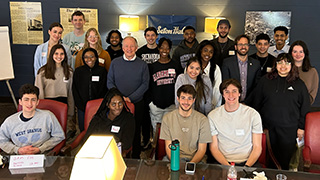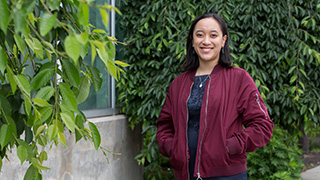CEO of Kinetix Group, John Strapp Visits the College of Arts and Sciences
Tuesday, May 14, 2024

Arts and Sciences students pictured networking with Chief Executive Officer John Strapp.
On Friday, April 19th, as part of the "Dean’s Career Speaker Series," the College of Arts and Sciences welcomed Mr. John Strapp ’69 to speak to students about the value that studying humanities, history, philosophy, religion, English and other languages bring to success in business. A foundational piece of Mr. Strapp’s address to current students was understanding the difference between acquired learning versus applied learning. As University students, he said, they are in the stage of life where they are acquiring learning. However, most of their lives will be spent applying what they have learned to real-world situations. In Mr. Strapp’s forty plus years of experience, he is convinced that the best way to prepare students for the professional world is to ensure that they bridge their education in business or STEM-related fields with a well-rounded education in the humanities, and vice versa. The humanities, he said, are essential to enable students to apply learning to the real world.

Chief Executive Officer John Strapp pictured presenting to College of Arts and Sciences students.
Mr. Strapp called on videos from Eric Berridge, author, entrepreneur and co-founder of Bluewolf, an IBM company, and Warren Buffett, co-founder and chief executive officer of Berkshire Hathaway, to illustrate how big corporations are looking to hire more humanities-related majors to build better solutions for their companies. While STEM-related majors often facilitate and implement innovation, overlooking humanities risks overlooking the tools to imagine innovations in the first place and the skills to represent them effectively. Without humanities majors, technology would not be able to communicate with businesses, and businesses would not be able to communicate their needs. "Though science teaches society how to do things," Strapp said, "humanities teach society the importance of why we should do things." Mr. Strapp also called on an example of a medical doctor communicating with their patients, to emphasize the importance of bridging the humanities and the sciences. Strapp explained that "even if a medical doctor understands all of the sciences behind why taking medication is beneficial to their patient, if they cannot effectively connect with their patient to communicate that, then the patient will suffer." People need to know how to read a room, to read each other and the social context, and to empathetically recognize the positions of the audience, whether patients, customers, executives or otherwise.

Arts and Sciences student pictured networking with CEO, John Strap.
The College of Arts and Sciences offers a wide array of academic programs and encourages students to blend their academic passions with practical career preparation, whatever careers they pursue. Students can readily cross major or minor in ways that combine humanities with STEM, social science, or preprofessional fields outside of the College. These opportunities include "applied humanities" programs: medical humanities, digital humanities and data studies, and, coming soon, business humanities. These applied humanities programs explicitly ask students to put the methods of interpretation, analysis, creativity and writing and the knowledge of sociohistorical context, ethics and logic to work, proposing dynamic solutions to challenges in healthcare, computing, business and society.
The College of Arts and Sciences also offers numerous dual degree programs that make versatile education with graduate degrees affordable and efficient, often allowing students to earn a masters degree one year faster than traditional programs.
Mr. Strapp encouraged students to capitalize on these opportunities to diversify their academic preparation and to have faith in their abilities and allow their confidence within themselves to shine through. He shared with students that the "secret ingredient" is "that the more confident you are in yourself, the better you will be able to communicate that to others."
Categories: Business, Campus Life, Education





